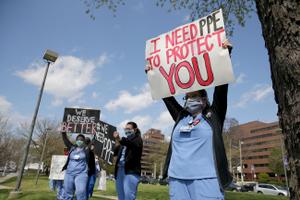Spotlight PA is a nonpartisan, reader-funded newsroom covering Pennsylvania state government and urgent statewide issues. Today through May 7, all donations to Spotlight PA will be DOUBLED. Give now at spotlightpa.org/donate.
HARRISBURG — The state has told hospitals it will not provide them with masks, gloves, and other protective equipment if they choose to resume elective surgeries, as the priority shifts to nursing homes, where most of Pennsylvania’s COVID-19 deaths have occurred.
“Teams have been literally scouring Pennsylvania and the nation and the Earth to try to get [personal protective equipment], and we have been able to do that,” Health Secretary Rachel Levine said at a state Senate hearing Monday. “In the past, that has gone to hospitals. And we will give out to hospitals when necessary now, but the focus … is on long-term care living facilities."
On March 20, Levine ordered hospitals to cancel or postpone elective procedures in an effort to reserve beds, ventilators, and other resources for coronavirus patients, who were expected to flood the health-care system. These procedures include heart catheterizations, joint replacements, and colonoscopies.
DONATE NOW » Spotlight PA provides essential public-service journalism thanks to readers like you. Help us raise $10,000 by Thursday and your gift will be DOUBLED. spotlightpa.org/donate.
A month later, as at least one major health system pressed ahead without state approval, Levine updated the order, allowing hospitals and ambulatory surgical facilities to resume elective procedures, as long as they could do so without compromising COVID-19 response.
States have been forced to compete for PPE since the coronavirus pandemic began, as suppliers and a federal stockpile struggled to keep up with rising demand. In early April, Gov. Tom Wolf ordered hospitals to disclose their inventory of ventilators and PPE, so the state could possibly commandeer those supplies to redistribute them to areas of highest need.
The worst has not come to pass in most parts of Pennsylvania, though there is a continuing need for equipment as many health-care professionals reuse masks and gowns in an effort to make limited supplies last. Levine said Monday that, while the state will still assist hospitals in hard-hit areas like Philadelphia, those that resume elective procedures will be cut off from the department’s stockpile.
“If you’re doing elective procedures, we’re not giving you any more PPE,” Levine said. “If you have enough PPE to do important but not emergency procedures, then we’re not going to be pushing out PPE to that hospital.”
Robert Shipp, vice president of the Hospital and Healthsystem Association of Pennsylvania, which lobbies on behalf of the state’s providers, said at Monday’s hearing many necessary surgeries and procedures have been put on hold since March.
“Having flattened the COVID-19 curve, it is crucial to start to safely reintroduce needed care for Pennsylvania patients,” Shipp said. “Continued postponement of care could result in negative health outcomes.”
But there’s also a financial incentive to resume these procedures.
A report by Health Management Associates, which was commissioned by the Hospital and Healthsystem Association, found operating margins for hospitals in the state dropped $914 million below estimates in March, partially as a result of the “cancellation and delay of all non-emergent procedures.” It warned that if the trend continued, the industry could see $4 billion in losses through June.
To resume elective procedures, the Department of Health asked facilities to affirm they could do so without jeopardizing the safety of patients and staff. However, these facilities do not need to seek approval from the state to proceed.
WE NEED YOU » Become a monthly sustaining donor to Spotlight PA today and help unlock a $10,000 match for our newsroom. Learn more at spotlightpa.org/donate.
The state adopted guidance from a number of groups including the American College of Surgeons and American Society of Anesthesiologists. In a joint statement, the organizations said hospitals should be prepared to meet an immense “pent-up patient demand for surgical and procedural care.”
The groups recommended hospitals hold off on returning to regular services until there is a marked reduction in COVID-19 cases in the region and until they meet other testing and supply benchmarks.
While most hospitals appear to be handling COVID-19 cases without any major issues, nursing homes are continuing to struggle. As of Monday, 67% of deaths in the state were attributed to fatalities of residents in long-term care facilities.
At the beginning of the pandemic, workers at these homes called for more protective equipment. The Pennsylvania Homecare Association, an industry organization that represents providers, wrote a letter to Levine in March asking for “guidance” on shortages of personal protective equipment.
“Nursing homes and personal care homes are where the vast majority of our PPE is going now,” Levine said Monday. “Many hospitals — not all — but most hospitals are doing fine with PPE, so we are pushing out PPE almost exclusively to long-term care living facilities.”
100% ESSENTIAL: Spotlight PA relies on funding from foundations and readers like you who are committed to accountability journalism that gets results. If you value our work, give a gift today and it will be matched dollar-for-dollar: spotlightpa.org/donate.
